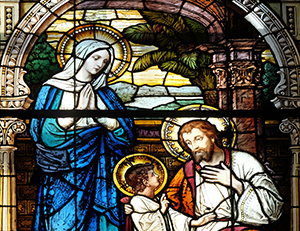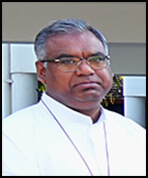
St. Joseph is the most inspirational saint for many, and I, too, have developed a special admiration for him from a young age because of his silent behavior. I have wondered how it was possible.
Our Scriptures speak very little about Joseph. In many ways, St. Joseph is the silent saint. He is never quoted, nor are any words attributed to him. Only Matthew and Luke have revealed a little about Joseph in the earlier chapters of their Gospels, and even then, we have only a few facts. They tell us that he was from Nazareth and a carpenter by profession. He was the husband of Mary, and by his behavior and deeds, he is referred to as a “just” or “righteous” man.
In wonder we learn about St. Joseph from his behavior on the following occasions:
- when he was engaged with Mary, who was bearing a child by the Holy Spirit;
- when the angel asked Joseph to accept her because it was God’s plan;
- when he went in search of a place for Mary to give birth;
- when he and Mary presented the Child Jesus in the Temple;
- when, by an angel’s word, he took Mary and the Infant Child to Egypt and later returned to their homeland; and
- when he and Mary searched for Jesus in the Temple and heard His reply.
In all these situations, did St. Joseph just accept the matters as they were, without giving thought to anything? Or did he reflect in some way to discover and accept these events as Divine Providence? Whatever the case, what an amazing and generous heart he had! And, it seems that all this was possible only by St. Joseph’s inner silence.
The wider Christian Tradition highlights the importance of silence, especially when it comes to surrendering to God’s will as a path to holiness and peace.
St. Augustine highlighted the importance of silence in the spiritual life, which allows for a deeper understanding of God and oneself. A true knowledge of God comes not from many words but from a heart that is quiet and attentive to God’s presence. St. Benedict instructed that maintaining silence was a way to foster humility and obedience. St. John of the Cross finds that silence was integral to the experience of mystical union with God. Silence was a means of creating an environment conducive for prayer and contemplation for many other saints.

According to Lao Tzu, “Silence is a source of great strength.”
St. Joseph reminds us once again about the virtue of being silent in order to surrender ourselves to the divine mystery for each one of us. Just as St. Joseph, on every occasion, encountered God in the inner sanctum of his heart in order to do God’s will in the salvation history, each one of us is called to encounter God in our hearts through times of silence and thus to know and do His will in our lives.
In our noisy and unsettled world, St. Joseph’s example inspires us to set aside time in silence to listen attentively to God’s voice and to cultivate an inner life of faith, which is missing in many places. It is within that inner silence that we will receive the grace to know God’s will and to do His will, not our will.
In that spirit, we cannot help but recall in this contemporary time the saint who was very close to St. Joseph and built the largest sanctuary dedicated to St. Joseph in the world in Montreal, Quebec—none other than our own brother, St. André Bessette. St. André Bessette famously encouraged people to seek the intercession of St. Joseph, saying, “When you invoke Saint Joseph, you don't have to speak much. You know your Father in heaven knows what you need; well, so does His friend Saint Joseph.”
And so, we pray on this feast day,
“Dear St. Joseph, help us to embrace the life of faith you lived so faithfully and beautifully.
Guide us to hear God's voice in the silence of our hearts, that we may discern His will.
Grant us the grace to surrender ourselves completely to His plan, finding true joy and peace in this life and in the life to come.
May our families and confreres be strengthened in love and protection, and may we serve others with humility, trusting in God's perfect plan. Amen.”

Br. Basker A. Samy, C.S.C., a member of the St. André Province in India, wrote this reflection for the Feast of St. Joseph, who is the Patron of the Holy Cross Brothers. He has worked many years in initial formation for the Congregation, and he currently serves as Director of the Moreau House of Formation in Salem, Tamil Nadu, in India.